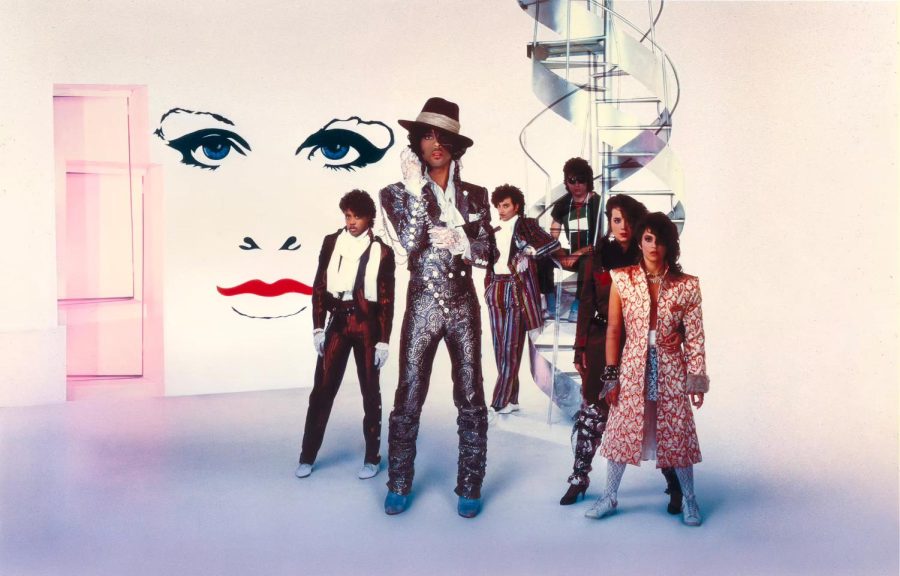Many of modern music’s most recognizable elements emerged in the 1980s. Pop music was beginning to hit its peak and hip hop was beginning its ascent to mainstream recognition as music was becoming a globalizing, uniting force within pop culture. The social awareness of the 70s was still alive and well, though this time around with a focus on exposing harsh truths rather than glossing over them.
“Purple Rain,” Prince (1984)
By 1984, Prince had already cast himself as an enigmatic, almost otherworldly figure in the pop landscape. On “Purple Rain,” he especially defies all traditional conventions, musically and aesthetically. The album is sonically characterized by synth, distorted guitars and Prince’s incredible vocal range. All nine tracks are nearly perfect, each feeling distinct yet intricately connected when strung together. The record’s quirks and idiosyncrasies (like the eerie spoken intro on “Computer Blue”) imply that the narrative portrayed in “Purple Rain” is a part of something much larger. While Prince’s aesthetic and creative vision are more than enough to warrant the album’s continued popularity and undeniable influence on pop music, there’s a vein of emotional resonance running below all the surface-level elements. That dark, existential undercurrent is what sets “Purple Rain” apart from other 80s pop records. On “Let’s Go Crazy,” presenting first as an infectious club track, one of the verses reminds listeners, “We’re all gonna die / And when we do / What’s it all for? / You better live now.”
“Straight Outta Compton,” N.W.A. (1988)
N.W.A.’s first studio album was released just as rap was breaking into the mainstream. However, the LA-based group’s vision of what the genre could accomplish was far beyond radio-friendly singles. The album exposed the harsh realities of life as a black man on the West Coast. Poverty, gang violence and police brutality are thoroughly explored, perhaps most explicitly on their most well-known track “F— Tha Police.” The group members have gone so far as to describe themselves as journalists, intending to depict life on the streets of LA as it was, not as the general public might’ve imagined it to be. The album begins, “You are about to witness the strength of street knowledge,” an understated introduction of what’s to come. At its core, “Straight Outta Compton” is utterly unapologetic. The lyrics are graphic, shocking and at times unsettling. It brought a sense of gravity and honesty to rap that had rarely been explored before. It opened the door for socially conscious hip hop that doesn’t cater to a white audience.
“Thriller,” Michael Jackson (1982)
Few other artists can claim to have had a more substantial impact on pop music than Michael Jackson. Selling over 100 million copies and winning eight Grammys, “Thriller” would not only go on to define Jackson’s solo career but would become an enduring pop classic. The record broke musical, social and cultural boundaries as it mixed aspects of funk, disco and rock. Although Jackson borrows from many genres, “Thriller” is a perfectly crafted pop album full of catchy hooks and upbeat singles. Though Jackson’s highly polished yet risk-taking style has become a mainstay of modern pop, “Thriller” broke barriers with an unprecedented amount of airtime on predominantly white radio stations. Upon its release, music critic John Rockwell wrote that the album was a sign “that the destructive barriers that spring up regularly between white and black music —and between whites and blacks— in this culture may be breached once again.”
“Graceland,” Paul Simon (1986)
Perhaps the most controversial album of the decade, “Graceland,” was written and partially recorded during Paul Simon’s time in Johannesburg, the largest city in South Africa. The trip, and the album’s eventual release, took place during the UN’s cultural boycott of South Africa in a protest against Apartheid. Due to its timing, the album was met with some outrage. Amid the controversy, Simon was quick to clarify that he was “with the [South African] artists” that had worked on the record and had paid them triple the union rate. Despite the tense public debate over the album, which draws heavily from multiple forms of South African music, it was met with critical acclaim and remains one of the most well-loved albums of its time. “Graceland” brought elements of South African music into the American public’s consciousness and enriched mainstream music.
“Paul’s Boutique,” Beastie Boys (1989)
“Paul’s Boutique,” released three years after Beastie Boys’ massively successful debut, was a commercial flop. The album’s over-saturated sound, excessive sampling and comedic lyricism alienated listeners. It’s those exact qualities, however, that have allowed the record to endure and gain its current reputation as a landmark album in hip hop. Before or since its 1989 release, there is nothing else quite like “Paul’s Boutique,” in part due to its polarizing use of sampling. The result feels more like a collage than anything else, with clips of audio cleverly interspersed where you least expect them. Messy, sprawling and at times disjointed, it’s an album that calls for endless listens—you’ll discover something new every time.
Molly Hamilton can be reached at [email protected].




















